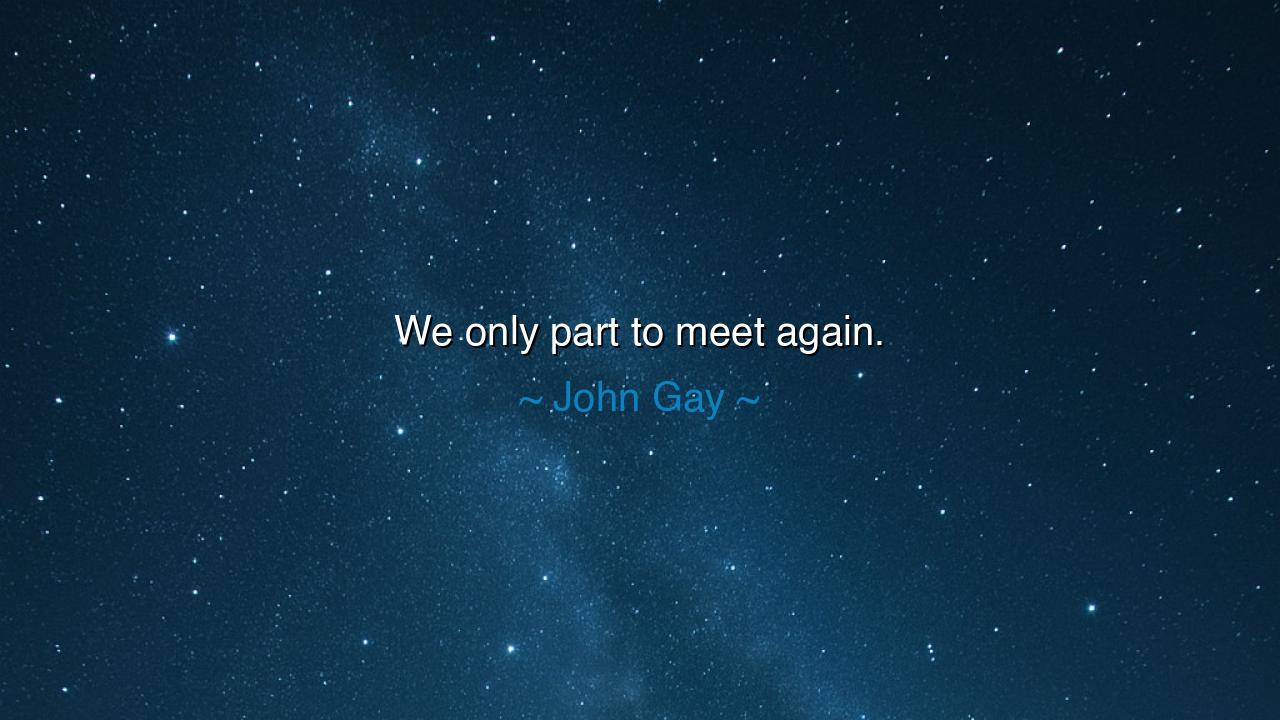
We only part to meet again.






The poet John Gay, in a line of gentle yet eternal truth, declared: “We only part to meet again.” These words, spoken with the quiet assurance of one who understood both love and mortality, echo across the ages as a balm for hearts wounded by separation. They remind us that parting is not an end, but a pause; not a death, but an interval before reunion. For in the great design of life and spirit, no true bond is severed forever.
To say we only part is to acknowledge the pain of distance, the ache of goodbye, the silence that follows when one we love is no longer near. Yet Gay gives to this sorrow a noble frame: every parting holds within it the seed of meeting again. It may be in this life, upon the turning of fortune, when the wanderer returns, when the soldier comes home, when friends meet after years apart. Or it may be in the life beyond, where the soul, freed from the dust of earth, finds once more the souls it has cherished. Thus, even in farewell, hope whispers.
History itself bears witness to this wisdom. Think of Odysseus and Penelope, parted for twenty years by war and wandering. How many nights must she have wept, how many times must he have feared he would never see Ithaca again? And yet, despite the long cruelty of absence, their story did not end in separation. They met again, and their embrace was all the stronger for the distance endured. Gay’s words live in their tale: their parting was but the prelude to reunion.
This truth is not confined to legend but lives also in the lives of common men and women. During the great wars of the twentieth century, countless families knew the agony of parting at train stations, unsure if they would ever meet again. Some reunions were joyous, with soldiers returning to their homes; others took place only in memory, with widows and children holding on to the belief that love unites souls beyond the grave. Yet even then, the words “we only part to meet again” gave strength, for they turned despair into endurance, sorrow into faith.
The deeper wisdom is this: no true connection dies. Bonds of love, friendship, and kinship are threads in a tapestry too strong to be torn by distance or death. Even when apart, we carry one another in memory, in prayer, in the quiet moments when a song, a place, or a scent brings the absent near again. In this sense, every parting is an illusion, for the spirit of the beloved never leaves us.
So let us learn from Gay’s words: when you face separation, do not surrender to despair. Hold fast to the certainty of reunion, whether on this earth or in the eternal realms of the spirit. Speak to your loved ones while you can, let no affection go unspoken, for time is swift. And when the hour of parting comes, say farewell not as an end, but as a promise: we shall meet again.
Practical action lies before us: write letters, keep memories, nurture faith. When absence presses heavily upon you, remember that love is not bound by geography nor conquered by death. Carry the presence of those you love within your heart, and live in such a way that when reunion comes—whether in this life or the next—you may embrace with joy and no regrets.
Thus, John Gay’s words endure as a song of consolation and courage. “We only part to meet again.” Let them be the lantern in the night of sorrow, the anchor in the storm of separation, and the pledge that love, once born, cannot perish.






AAdministratorAdministrator
Welcome, honored guests. Please leave a comment, we will respond soon